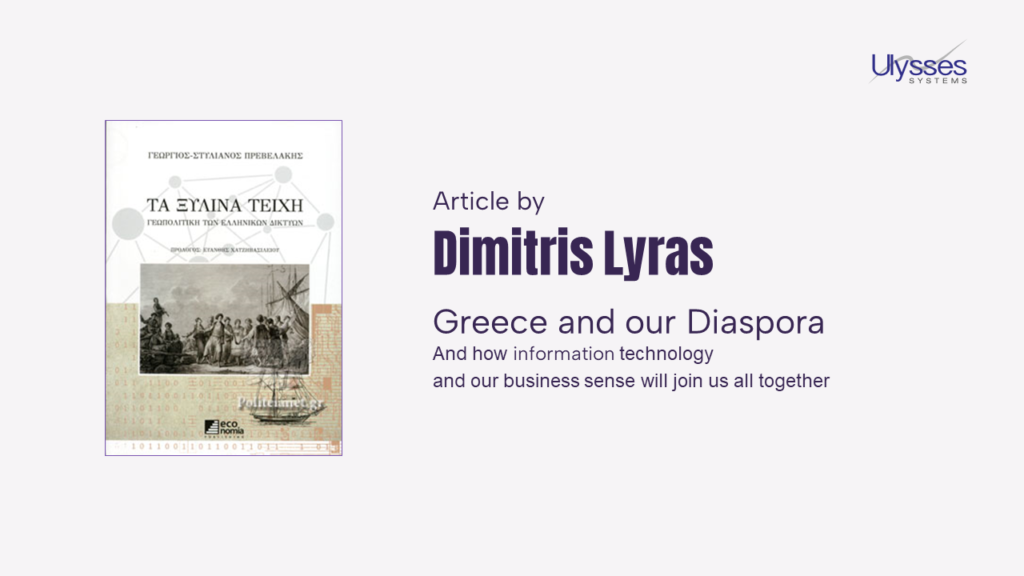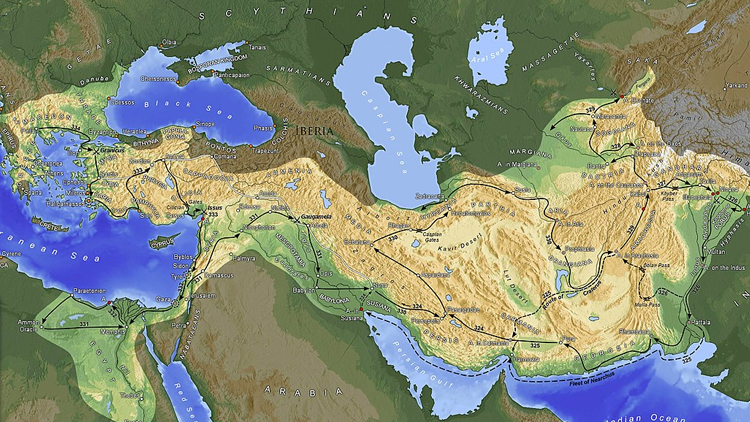

George Prevelakis, in his book “Xylina Teichi”/Wooden Ramparts, expresses unprecedented optimism for Greece and its Diaspora. In an age of advanced technological globalization, he sees networking to be a momentous opportunity, assisted by the already widespread technology that has become a new mainstay in human contact. And in recent years we have seen how people in remote islands of Greece participate in new ship deliveries in Korea or solve problems on a ship in the Atlantic.
In this write up, we will discuss why the business sense of Greeks using the «galactic» concept of reasoning compared to the hierarchical and «dendric», that George Prevelakis mentions in his pivotal book, can connect Greeks across the world to achieve far more than utilitarian communication.
Greeks and our Diaspora
How information technology and our business sense will join us all together
But what if we said that Greeks are at the forefront of information technology because they innately understand how to organize thought to achieve goals? What if we said that Computer Science is missing the Greek mentality in order to overcome the rigidity and preoccupation it causes us, letting it blend intuitively with people and their lives?
Greek mentality
Prof Prevelakis describes how the Greek mentality benefits acutely from modern technology. How the Greek mentality which has served so well in shipping and in the success of Greeks in foreign countries can be assisted by technology. This he argues in his book, is because the «galactic» reasoning framework enables an intuitive organisation of knowledge to achieve goals. For example, structural constraints in society and in government bureaucracy, become opportunities for Greeks. Greeks in the Diaspora bypass the societal strata in countries like the UK or Japan and liaise with exclusive groups to achieve their goals without even breaking a sweat. Greeks create networks of value joining disparate groups like political factions to achieve a greater good.
Greeks see the law as a by-product of common sense and not some unintelligible obstacle course that stakeholders must memorize. Imagine how Greek mentality can then enable the world assisted by modern technology. How Greek affinity for abstraction helps problem solving and innovation. In ancient times the prophecies of oracles were enabled by viewing situations from a higher level of abstraction. Every day there is someone, who solves problems by lifting the level of abstraction to include solutions in different but compatible domains.
Imagine
Then, imagine a Diaspora consisting of a percentage of Greeks who in one way or another are immersed in information technology as a result of the so-called brain drain. And imagine they can transform information technology and use it far more effectively, unencumbered by weak structures like social media that is agnostic of people’s goals and the world in which people operate. Connecting Greece to the Diaspora is natural and recently quite pervasive, as virtual meetings have gone viral. But Greeks leading information technology is perhaps not obvious.
The next and pivotal step in information technology
There is one overarching theme as to the way the Greek mentality is the next and pivotal step in information technology. For a view on Information Technology in the Maritime Industry we recommend you read the part 2 of this article.
Goal-based relationships
Greeks don’t aspire to obscure relationships of knowledge to understand the world. They use goal-based relationships. This needs some explanation.

Greek mariners throughout history have not been confused by the different laws in every country and how they are organized. And in Homer’s Odyssey there is a lot about conflicting cultures in every new place but not much about political structures. There is, in fact, little comparison of regimes in the Odyssey. And there are no conflicts of regimes, only of goals.
Contrast Greek mariners with mariners like Colombo
Greek mariners have rarely taken an acute interest in the regimes in any country they visit. Contrast this with mariners like Colombo or any in the age of discovery. Greek mariners who have arguably been traced to places like the Northern Peninsular of Michigan in early history and all the familiar places like the Black Sea and India, have not been known to have sponsorship from the Greek State to export a political regime. I am not a historian, but it seems a good question to ask as to why Greeks were not known for enabling government infrastructures and better known for private enterprise.
Greek empire building in contrast to the British, the Spanish, and the nomadic empires
Even Alexander sought to infiltrate and join cultures and paid ultimate attention to how proliferation was achieved and less to some system of governance or religion. This is in contrast with the British empire, the Spanish, the nomadic empires, and most other empires. All these promoted belief systems and political structures mixed with their goals. Our very own Greek star performance in establishing democracy was never packaged for export.

Information technology as it exists today has no goals
Information technology as it exists today has no goals. It gathers information and presents the information it gathers. The people using it have the goals and the software serves the people but knows nothing about goals. Rather like a government structure that enables many people to go their own way with minimum conflict but does not organize the actual processes that lead to the goals of its citizens. This has succeeded resoundingly well in government as well as in software. But like government structure it is a weak tool for persisting and achieving goals, organizing goal prioritization, and coordinating goals of different groups.
Software has no structure to depict its own goals, just documents or diagrams that describe what is sought by the clients and designers. Similarly, laws of governments do not persist what people do and why the laws are needed. It is assumed that people know the goals. However, a conventionally designed computer software does not.
70% overlap with a competing application
All this is fine as an academic discussion, but the practicality is that each software application has 70% overlap with a competing application. Why all the wasted effort making for only a small 30% differentiation. Unlike physical products, software does not have a single permanent component. So why can’t it be changed or merged? So as to reuse the 70% that is the same to support another application that is missing this part and exploit the 30% that is unique by joining that unique part with another unique component.
Why can’t two software systems be joined or integrated easily?
Why can’t two software systems be joined or integrated easily? The reason is software has no way to assess what it can do or be compared to another similar system.

Whereas two ex-mariners in a ship repair, quickly learn how to combine their unique knowledge and efforts to expedite the work. Software needs to be able to do this.
Goal oriented practical thinking: Using abstractions to solve problems
This is the part that Greeks are likely to recognize about information technology first. And it is truly a massive opportunity for people with goal oriented practical thinking. People, who are also comfortable using abstractions to solve problems. And this is typical of Greeks throughout history.
Of course, other cultures can do the same, but when most other cultures convene to collaborate, they create government-like «Dendric» structures; scope, definitions, standardisations etc. In information technology too, they create software-building structures borrowed from physical sciences, by extensively using definitions and standardisations. Organizing goal-based endeavours via constructs from physical science may, therefore, leave room for improvement.
Goal structures in software are the most appropriate
There are many outstanding thinkers and achievers who are shut out of computing by the inappropriate use of engineering and scientific structures in software rather than the goal structures which are more appropriate. Greeks who have shown an affinity for intuitive reasoning may be the best suited to make the improvement in information technology as well as make full use of the latest communication practices to join networks of value at home and in the diaspora.
